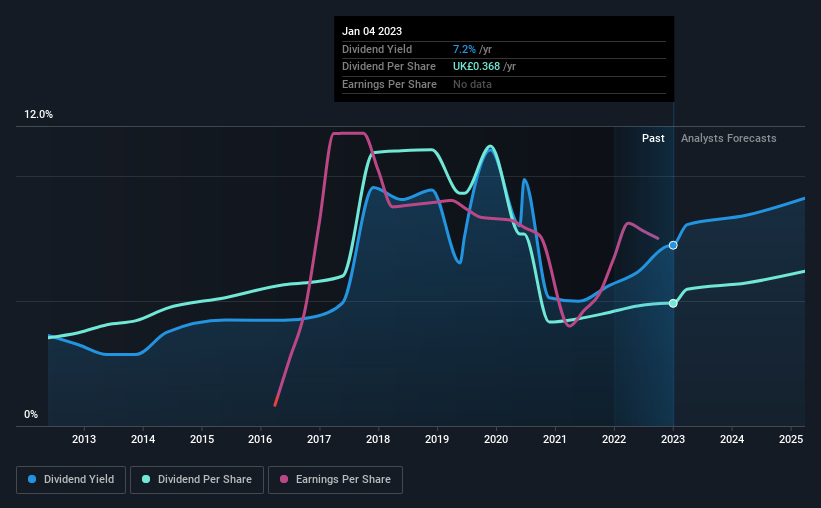- United Kingdom
- /
- Diversified Financial
- /
- LSE:PAY
PayPoint's (LON:PAY) Upcoming Dividend Will Be Larger Than Last Year's
PayPoint plc (LON:PAY) will increase its dividend from last year's comparable payment on the 6th of March to £0.092. This will take the annual payment to 7.2% of the stock price, which is above what most companies in the industry pay.
View our latest analysis for PayPoint
PayPoint's Earnings Easily Cover The Distributions
While it is great to have a strong dividend yield, we should also consider whether the payment is sustainable. PayPoint was earning enough to cover the previous dividend, but it was paying out quite a large proportion of its free cash flows. The business is earning enough to make the dividend feasible, but the cash payout ratio of 89% indicates it is more focused on returning cash to shareholders than growing the business.
Over the next year, EPS is forecast to expand by 26.0%. If the dividend continues along recent trends, we estimate the payout ratio will be 52%, which is in the range that makes us comfortable with the sustainability of the dividend.

Dividend Volatility
Although the company has a long dividend history, it has been cut at least once in the last 10 years. Since 2013, the annual payment back then was £0.265, compared to the most recent full-year payment of £0.368. This means that it has been growing its distributions at 3.3% per annum over that time. The dividend has seen some fluctuations in the past, so even though the dividend was raised this year, we should remember that it has been cut in the past.
Dividend Growth May Be Hard To Come By
Growing earnings per share could be a mitigating factor when considering the past fluctuations in the dividend. In the last five years, PayPoint's earnings per share has shrunk at approximately 9.6% per annum. If earnings continue declining, the company may have to make the difficult choice of reducing the dividend or even stopping it completely - the opposite of dividend growth. It's not all bad news though, as the earnings are predicted to rise over the next 12 months - we would just be a bit cautious until this can turn into a longer term trend.
In Summary
Overall, this is probably not a great income stock, even though the dividend is being raised at the moment. The company hasn't been paying a very consistent dividend over time, despite only paying out a small portion of earnings. This company is not in the top tier of income providing stocks.
Companies possessing a stable dividend policy will likely enjoy greater investor interest than those suffering from a more inconsistent approach. At the same time, there are other factors our readers should be conscious of before pouring capital into a stock. Taking the debate a bit further, we've identified 2 warning signs for PayPoint that investors need to be conscious of moving forward. Is PayPoint not quite the opportunity you were looking for? Why not check out our selection of top dividend stocks.
New: Manage All Your Stock Portfolios in One Place
We've created the ultimate portfolio companion for stock investors, and it's free.
• Connect an unlimited number of Portfolios and see your total in one currency
• Be alerted to new Warning Signs or Risks via email or mobile
• Track the Fair Value of your stocks
Have feedback on this article? Concerned about the content? Get in touch with us directly. Alternatively, email editorial-team (at) simplywallst.com.
This article by Simply Wall St is general in nature. We provide commentary based on historical data and analyst forecasts only using an unbiased methodology and our articles are not intended to be financial advice. It does not constitute a recommendation to buy or sell any stock, and does not take account of your objectives, or your financial situation. We aim to bring you long-term focused analysis driven by fundamental data. Note that our analysis may not factor in the latest price-sensitive company announcements or qualitative material. Simply Wall St has no position in any stocks mentioned.
About LSE:PAY
PayPoint
Engages in the provision of payments and banking, shopping, and e-commerce services and products in the United Kingdom.
Reasonable growth potential with adequate balance sheet.
Market Insights
Community Narratives





